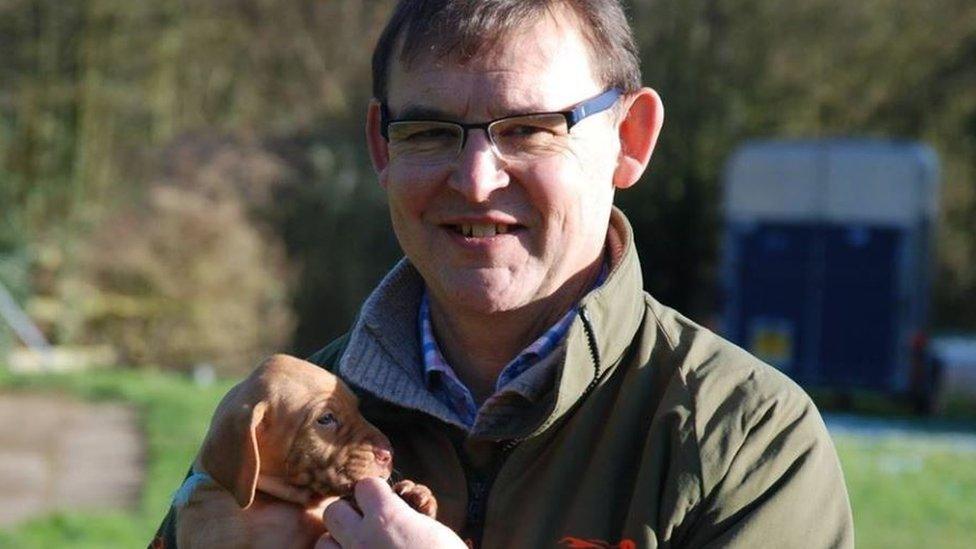Coronavirus: The Brits stranded abroad due to the virus
- Published
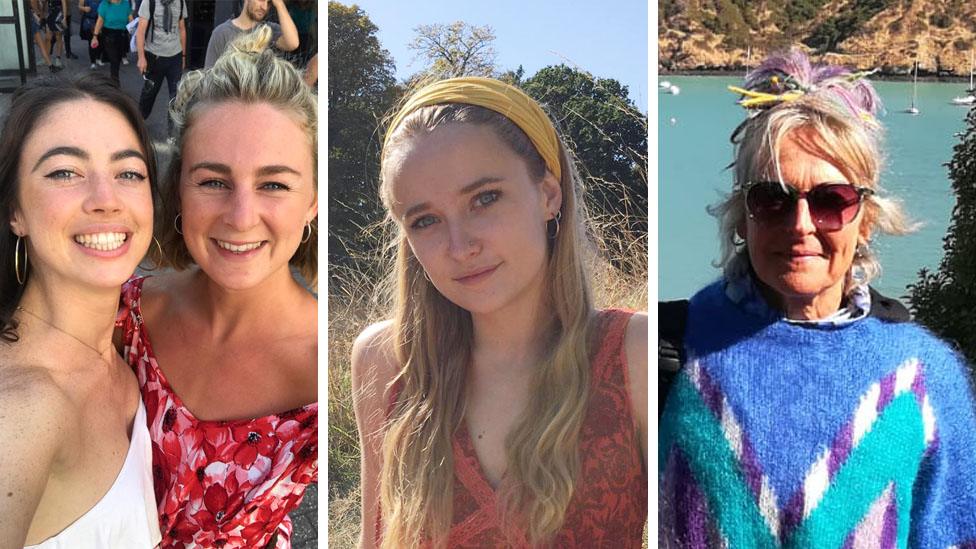
"Get us home. People here are terrified. Some for their lives and for their families' lives. You can't just leave us out here."
Ellie Hicks, 21, and her three friends are stranded in Bali, Indonesia, because of the coronavirus.
The group were just a few weeks into a three-month backpacking trip when the government urged all British nationals to return to the UK.
Other countries were going into lockdown, banning flights and closing their borders to try and stop the virus from spreading.
Ellie and her friends spent over £1,000 each booking new flights back to the UK from Bali - only for them to get cancelled at the last minute. They've not had their money refunded.
So the group has now been left stranded 7,000 miles away from home with a massive dent in their funds.
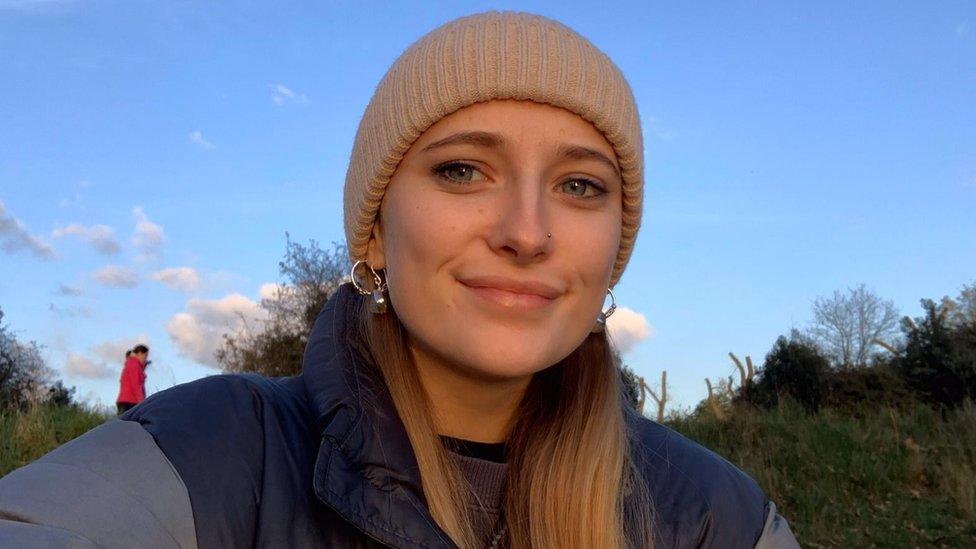
Ellie works in social care so is classed as a key worker
Ellie, from Teddington, south-west London, says she has no idea when she will get back home which is "terrifying".
She is on medication for depression and is worried about what will happen if she runs out.
"It's really affecting me personally," she said. "I'm with my boyfriend and he's got bad anxiety.
"So it's shot us both in the foot. It's draining being constantly on the phone at 1am and 2am and emailing.
"I'm unable to sleep. I wake up at 5am and I'm not eating properly. It's crazy."
Ellie and her friends have been relying on kind-hearted locals to help them out during their time stuck abroad.
She says the government's response to the situation has been "awful".
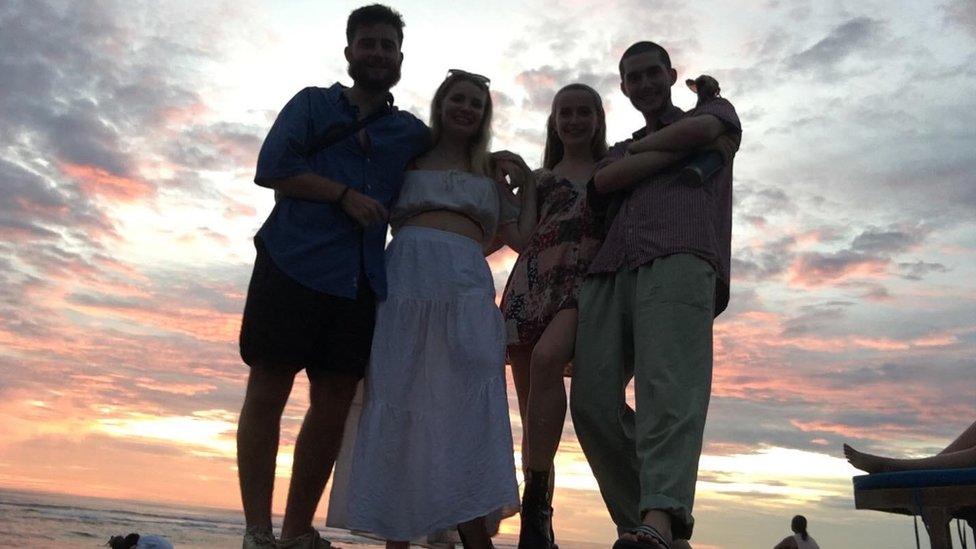
Ellie and her friends are on a three-month backpacking trip
"We found a guy who is renting out villas for the price of a hostel - all the hostels have closed down - which is unheard of.
"The people of Bali have really been helping us out. We're in a Facebook group with a lot of other people.
"There's about 1,000 other people trapped in Bali and the hotels have been giving discount prices and grouping together.
"From the first day the FCO told us we had to head home we've been in touch with the embassy but no-one is helping out.
"We can't afford another flight and there's no clear answers. It feels like they don't really care."
There isn't a register of how many British tourists are abroad - but the government says it could be anywhere between 300,000 and one million.
Freddie Collins, 26, and Claire Scrivener, 27, are junior doctors who work for a hospital in Croydon, south London.
They're currently on a year out of training in Peru and were due to fly back to the UK on 18 March - but then the country went into lockdown.
They say they're desperate to get back so they can help their NHS colleagues who are dealing with the coronavirus pandemic.
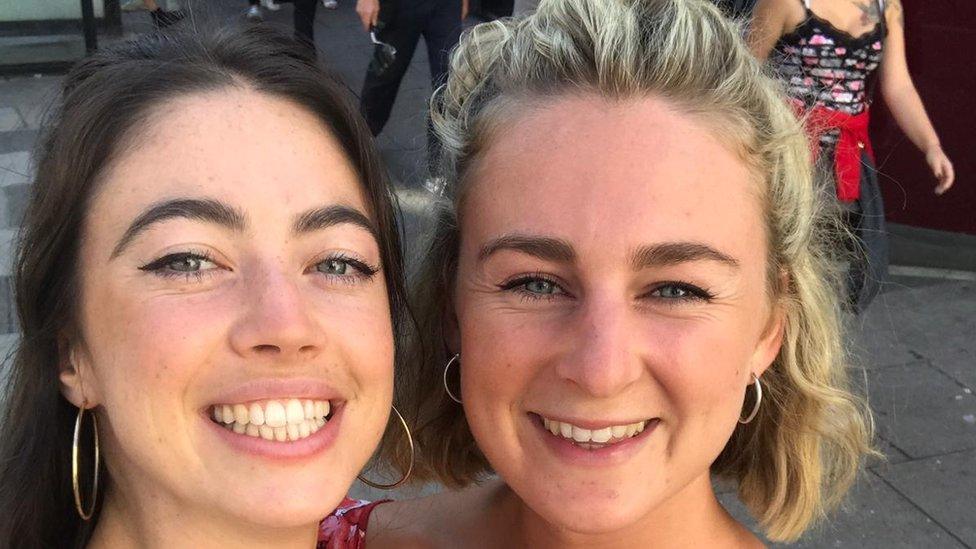
Freddie and Claire are junior doctors stranded in Peru
Freddie said: "We have a WhatsApp group of colleagues and we're hearing things are starting to get difficult.
"To know we could be being useful back at home is very frustrating."
Claire added: "When we were living in London we lived with a physio who is working so hard on the coronavirus. It's frustrating to know we can't be there to help with rota gaps.
"We want to be part of the comradery and offer people support."
The government organised for a flight to rescue some of the UK nationals from Peru - which arrived in London on Thursday.
Allow X content?
This article contains content provided by X. We ask for your permission before anything is loaded, as they may be using cookies and other technologies. You may want to read X’s cookie policy, external and privacy policy, external before accepting. To view this content choose ‘accept and continue’.
But Freddie and Claire are living in Puno - which is a 24-hour journey from Peru's capital Lima - so they're still waiting to hear when they will get home.
The pair have started re-watching Friends from series one to keep themselves entertained - only when the Wifi is working, though.
Like many others, the doctors have also found it difficult to get help and answers from the government.
Claire: "What most people find frustrating from the embassy is the absence of communication. They don't answer the phone and don't reply to emails. The only way to contact them is on Twitter and they don't reply. There's no dialogue."
Freddie: "We don't underestimate the challenge of getting people back but I think it's frustrating to see other countries do it so quickly. Israel got its citizens back and Mexico - so it is possible.
"Even if it does take this long, just a daily update to reassure us."
Allow X content?
This article contains content provided by X. We ask for your permission before anything is loaded, as they may be using cookies and other technologies. You may want to read X’s cookie policy, external and privacy policy, external before accepting. To view this content choose ‘accept and continue’.
Allow X content?
This article contains content provided by X. We ask for your permission before anything is loaded, as they may be using cookies and other technologies. You may want to read X’s cookie policy, external and privacy policy, external before accepting. To view this content choose ‘accept and continue’.
On Twitter, Brits stranded in New Zealand have been sharing their anger at the government over what they say is a lack of help to get them back to the UK.
Many people are frustrated because they say other countries have arranged repatriation flights for their citizens but the British government isn't doing the same.
The German government has been working with German airline Lufthansa to arrange rescue flights from places, external including New Zealand, Costa Rica, India, Namibia and Argentina.
Marie Young, 54, from Beccles, Suffolk, is in New Zealand with her ex-husband - who she is friends with - after saving up for three years for the trip.
It was at the top of her bucket list of things to do after she was diagnosed with breast cancer in 2016.

Marie's trip to New Zealand was top of her bucket list
The pair were due to return back to the UK this weekend - but their flights were cancelled - and now a one-way flight back is costing around £15,000.
They're now relying on the kindness of a stranger they met in a supermarket who offered them an apartment to stay in for free.
"Loads of people stuck on camp sites costing £150 a night with no showers or toilets. Lots are in the position where they have no money to buy anything," says Marie.
"The embassy and consulate don't seem to be doing anything to help us at all. There's people camping out at the embassy at Wellington and they still won't give out advice.
"There's loads of people in the campsite and they're really frightened. "We don't know how long we're going to be here.
"When you go on holiday you have enough money for the holiday, you don't have enough for six months - everybody's in same boat."

A SIMPLE GUIDE: What are the symptoms?
NEW GUIDANCE: What must I do?
NEW RESTRICTIONS: What are they?
LOOK-UP TOOL: Check cases in your area
MAPS AND CHARTS: Visual guide to the outbreak

Foreign Secretary Dominic Raab addressed the issue in Parliament on Tuesday and said his staff were working with other nations and airlines to "overcome barriers".
Responding to an urgent question, he said the situation was being made worse by countries closing their borders "with no or little notice".
Mr Raab told MPs that special flights will be laid on later this week to bring Britons back from Peru, while the UK had agreed with Singapore that it will act as a transit hub to help those trying to get back from Australia and New Zealand.
He said British nationals who were running out money could, as a last resort, get an emergency loan from the Foreign Office.
On Friday, the Foreign and Commonwealth Office (FCO) announced it had organised three more flights to bring UK tourists back from Peru - with the first one leaving on Sunday.
The FCO told the BBC it recognises British tourists abroad are finding it difficult to return to the UK.
It did not explain why it is not arranging for more repatriation flights to bring back stranded UK nationals from across the globe - not just Peru.
A spokeswoman said: "The government is seeking to keep key transit routes open as long as possible and is in touch with international partners and the airline industry to make this happen.
"Consular staff are supporting those with urgent need while providing travel advice and support to those still abroad."
- Published28 September 2020

- Published27 March 2020
- Published26 March 2020
